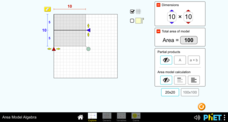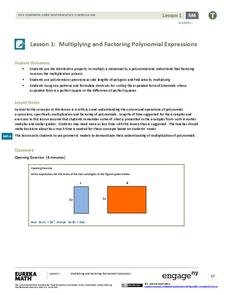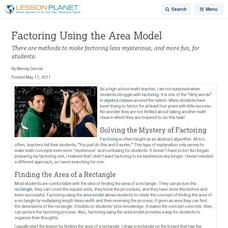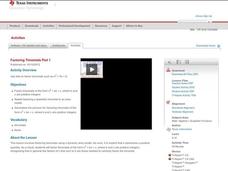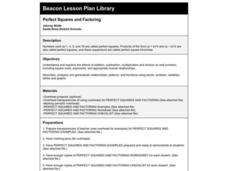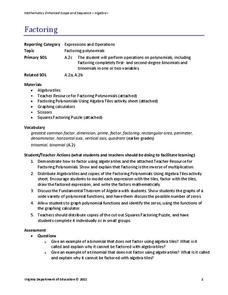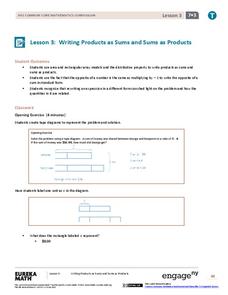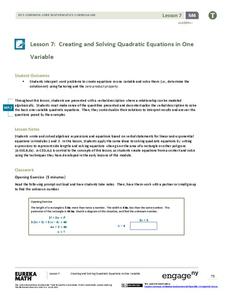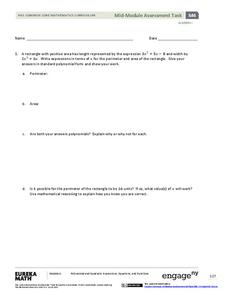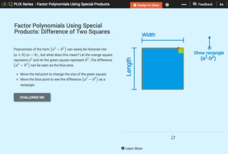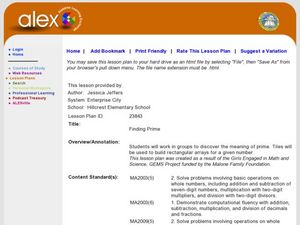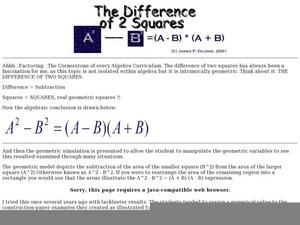PHET
Area Model Algebra
Expand the pupils knowledge of using area models to algebra. The interactive allows learners to use the same procedure of getting partial products when multiplying multi-digit numbers to multiplying polynomials. Scholars see how the...
Education Development Center
Area Model Factoring
Introduce learners to what factoring represents and it's relationship to a square with a resource about factoring and the method of area models. The questions are scaffolded to begin with introductory questions and eventually have...
West Contra Costa Unified School District
Factoring Quadratic Expressions
Factor in different strategies in a lesson plan for factoring quadratics. Young mathematicians first create tables and area models to factor quadratic trinomials into two binomials by guess and check. Learners then investigate how they...
Center for Mathematics and Technology
Whole Numbers: Using an Area Model to Explain Multiplication
There are many ways to work through a multiplication problem. Using an area model, kids complete several worksheets with different types of multiplication problems, including multiplying by ten, and explain how the new strategies differ...
Curated OER
FOIL method using the area model
For this FOIL method worksheet, students multiply binomials using the FOIL method and the area model. Students find the area of rectangles to investigate why the FOIL method works. Worked examples are provided.
EngageNY
Multiplying and Factoring Polynomial Expressions (part 1)
Polynomial multiplication and factoring go hand in hand. Why not teach them together. This resource begins with an area model for distributing a monomial and then connects the process to factoring the GCF. Learners then advance to...
CK-12 Foundation
Factorization of Quadratic Expressions: Algebra Tiles
What does it mean to factor the difference of two squares? The interactive presents an area model of the difference of two squares. Pupils rearrange the model to create a rectangular area. The learners determine the length and width...
Curated OER
Factoring Using the Area Model
There are methods to make factoring less mysterious, and more fun, for students.
CK-12 Foundation
Solving Problems by Factoring: Building a Doghouse
Building a doghouse is easier with a little mathematical help! Young scholars use sliders to adjust the length of the doghouse and watch as it affects the width and area. They then answer questions that help them discover the question...
Curated OER
Factoring Trinomials
Have the class factor and solve trinomials of integers in the form x2 + bx + c, where b and c are positive. They relate factoring to area and then follow a specific format to factor their trinomials. Tiles are used to help them...
EngageNY
Advanced Factoring Strategies for Quadratic Expressions (part 1)
Factoring doesn't have to be intimidating. Build on prior knowledge of multiplying binomials and factoring simple trinomials to teach advanced factoring of quadratic expressions with a instructional activity that uses various methods of...
Flipped Math
Unit 9 Review: Factoring
Make it complete. Pupils work through 16 problems to review factoring. The problems consist of straight factoring of polynomial expressions, solving equations by factoring, and applying factoring to real-world problems.
Curated OER
Perfect Squares and Factoring
A teacher guided lesson on perfect squares and factoring. They discuss perfect squares, observe the expansion steps for finding the product, and practice solving problems. They complete a worksheet on perfect squares and factoring.
02 x 02 Worksheets
Factoring
Factor in this resource when teaching how to factor polynomials. Scholars use algebra tiles to factor linear and quadratic expressions. They practice their skill by working on example problems from a worksheet.
Curated OER
Factoring Trinomials
Students factor trinomials. In this algebra lesson, students identify the different integers making up the trinomial and use the special pattern to factor them. They continue to model the equations and how to factor correctly.
EngageNY
Writing Products as Sums and Sums as Products
Create rectangle and area models to help students understand expressions. The third installment in the 28-part series has pupils first represent expressions using rectangular array models. The exercises help scholars understand the...
EngageNY
Creating and Solving Quadratic Equations in One Variable
Give your classes practice at modeling using quadratic models with a resource that uses area and integer problems to allow individuals to create second degree polynomials. Young mathematicians solve equations using factoring and then...
EngageNY
Mid-Module Assessment Task - Algebra 1 (module 4)
Performance task questions are the most difficult to write. Use this assessment so you don't have to! These questions assess factoring quadratics, modeling with quadratics, and key features of quadratic graphs. All questions require...
CK-12 Foundation
Factor Polynomials Using Special Products: Difference of Two Squares
Factoring patterns are not magic! Show your classes how to model the difference of two squares' factors using an area model. Learners manipulate the width and length of two squares to represent the polynomial a^2-b^2. They use the model...
CK-12 Foundation
Using Quadratic Equations to Solve Problems: Construct a Soccer Field
Build a soccer field through a little mathematical analysis. Individuals manipulate the dimensions of a soccer field as they drag points to new positions. The simulation shows the corresponding intercepts and area. As pupils explore the...
Curated OER
Exploring Solving Equations
Put out by Texas Instruments, this lesson involves learners in an activity focused on adding polynomials, solving equations, factoring trinomials, and expanding binomials. A TI-89 calculator is needed to complete this lesson.
EngageNY
Polynomial, Rational, and Radical Relationships
This assessment pair goes way beyond simple graphing, factoring and solving polynomial equations, really forcing learners to investigate the math ideas behind the calculations. Short and to-the-point questions build on one another,...
Alabama Learning Exchange
Finding Prime
Fifth and sixth graders explore prime numbers. They work with a partner to build rectangular arrays using twelve tiles. Factor pairs are noted and recorded on graph paper. Pupils construct rectangular arrays with a prime number and...
Curated OER
The Difference of 2 Squares
Students factor a difference of two squares. In this factoring a difference of two squares lesson, students use manipulates cut from a piece of paper to illustrate the difference of two squares. Students illustrate the...
